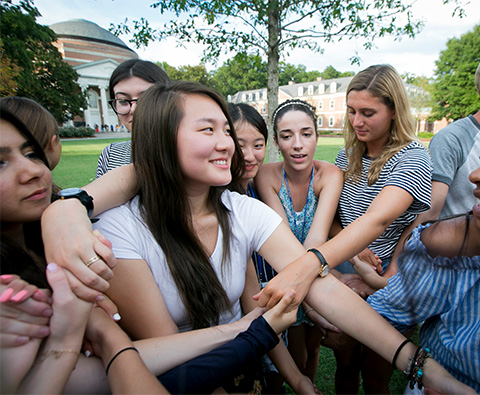Find the answers to your frequently asked questions right here.
We’ve gathered answers to the questions we hear the most. However, if your questions or concerns aren’t answered below, Duke students, please contact Kevin D'Arco, Senior Associate Dean of International Students. You can reach him via email at kevin.darco@duke.edu or by phone at 919-681-3922.

Frequently Asked Questions
Duke welcomes applications from undocumented and DACA students, and uses the same "need-blind" process as applicants who are U.S. citizens or permanent residents. The need-blind model allows Duke to create a class characterized by both exceptional talent and meaningful diversity. If you are interested in applying for Duke for undergraduate study, please consult the Admissions Office. If you are interested in applying for graduate/professional study, please check with the school/program directly.
The U.S. Citizenship and Immigration Services continues to accept DACA applicants from individuals who currently have or previously had DACA. For more detailed information, please consult US Citizenship and Immigration Services. Although the fate of the DACA program remains uncertain, Duke is firmly committed to protecting the right of all students to learn and discover, regardless of their background or immigration status.
Please appoint a family member or a trusted friend as your representative. If you are stopped or detained off campus, ask your representative to page the Dean-on-call at 919-970-4169, and the Dean-on-call will respond and connect you with appropriate resources.
If you earned less than $55,000, you are eligible for free tax preparation assistance from Duke Law School’s Volunteer Income Tax Assistance Program (VITA). You can get more information at the VITA site.
It is normal to feel anxious at this time of uncertainty. You should seek support from others, such as family, friends, religious/spiritual communities, student groups, and your Duke advisors. Duke Counseling and Psychological Services provides professional support and adheres to confidentiality rules that protect all students' privacy. It also provides a list of resources on how to care for oneself and others.
If you have been granted deferred action under DACA, you are eligible to apply for a North Carolina driver's license for the duration of your permission to remain in the US, and if you meet all other statutory requirements. For more information consult North Carolina Division of Motor Vehicles.
If you entered the US without inspection, you do not have an immigration status. DACA approval does not grant you a valid status. If you entered the US legally but overstayed, and you are over the age of 18, you may be accumulating time toward “unlawful presence” in the US and subject to a 3- or 10-year bar from re-entering the US. Please consult with an immigration attorney who can evaluate your circumstances.
Please consult your home school's class attendance and missed work policy. If you need financial assistance for travel, please consult with your financial support counselor.
The US immigration regulations define “child” as an unmarried person under the age of 21. A “child” can be deported. If you are concerned that you may not be able to take care of certain matters for yourself, you may consider appointing a family member or a trusted friend the power to make decisions on your behalf or "Power of Attorney". For more information, please consult the North Carolina Bar Association.
You can find a list of domestic summer opportunities and graduate opportunities as well as graduate schools with support for DACA/undocumented students through Office of Undergraduate Scholars and Fellows.
You can also get email updates and schedule an advising meeting online.
Duke offers many programs outside of Durham, including the Duke Marine Lab. The Global Education Office administers semester programs in DC, New York, and Los Angeles as well as summer programs in Alaska, Chicago, New York, and Silicon Valley. DukeEngage offers immersive summer service programs throughout the U.S.
REAL ID is a federal law that requires states to verify the citizenship and identity status of their residents before issuing driver's license or identification for certain federal purposes. On October 1, 2020, non-READ ID forms of identification will no longer be accepted at federal building and for domestic flights. Documents issued by foreign government, such as passports and the Mexican Matricula, are acceptable forms of identification to fly on domestic flights and will remain so. REAL ID-compliant identification cannot be issued to undocumented individuals, including DACA recipients.
Helpful Duke Resources
Academic Resource Center
Kimberly Bethea
Director
684-9384
Graduate School
Alan Kendrick
Assistant Dean for Graduate Student Development
668-0416
Immigrant Rights Clinic
Kate Evans
Clinical Professor of Law & Director
613-7000
Office of Durham & Community Affairs
Sandra Martinez-Zuniga
Employee Giving Campaign Manager/Advisor, Define American
684-6296
Pratt School of Engineering
Lupita Temiquel-McMillian
Assistant Dean for Undergraduates
660-5996
Duke LIFE and Rubenstein Scholars
Sachelle Ford
Director
660-3070